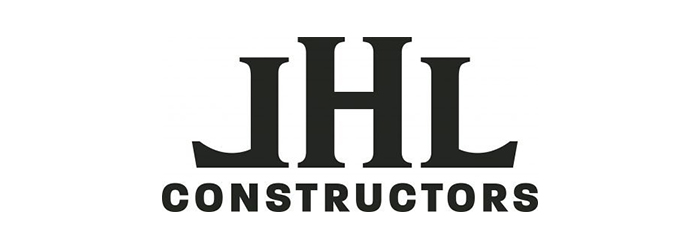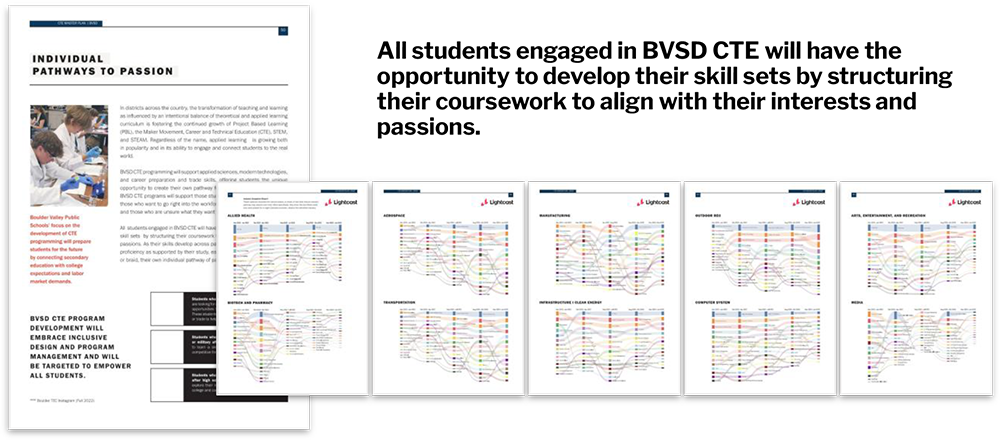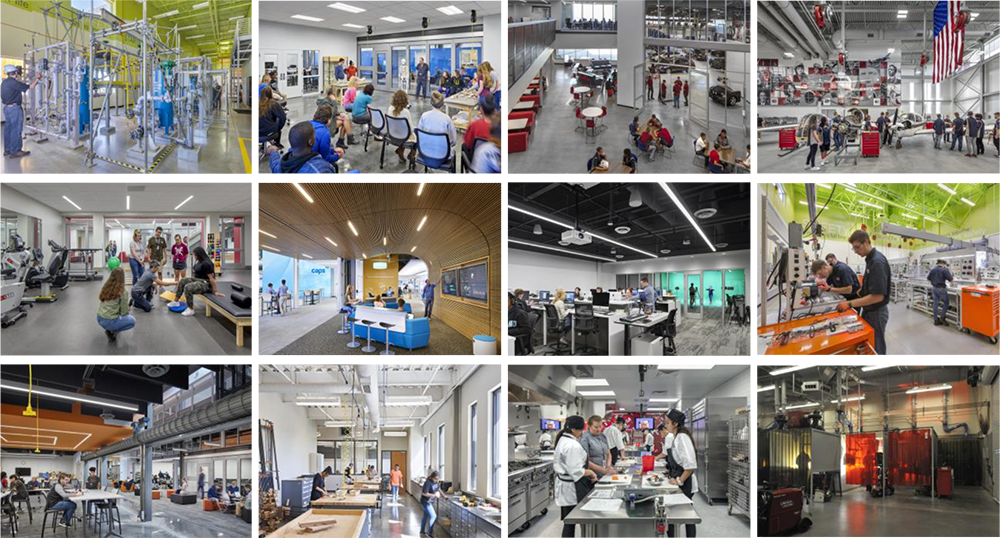| WEDNESDAY | NOVEMBER 15, 2023 |
| 5:00 – 7:00 PM |
Reception
Guest Speaker/Performer: Join Mark Powell and his journey. From song writer/performer/event planner/historic inn
operator. What makes you think you can do anything? Mark Powell (markpowellmusic.com); Seven Keys Lodge;
Outlaws and Legends Music Festival
|
| DAY 1 – THURSDAY | NOVEMBER 16, 2023 |
| 7:00 – 7:30 AM |
Breakfast
|
| 7:45 AM |
Buses Depart Hotel
The tours were purposefully crafted to focus on different responses to individual district’s visions of CTE/”Applied Learning”/Industry Connection goals. We hope that they launch our symposium
correctly and will serve as a catalyst to illustrate the breadth and depth of programs that benefit from architecture that enables.
|
|
Tour – Option 1 
|
|
Tour – Option 2 
|
|
Tour – Option 3 
|
|

|
| 1:15 – 1:45 PM |
Lunch / Opening Remarks / Welcome
- Chuck Saylors, A4LE; Chairman ‘24
- Pam Loeffelman, DLR Group; Symposium Chair
As part of the symposium, we have crafted comments and questions to create a framework for the symposium. The questions should serve as a starting point for each of the moderators to
dive deeper into the different approaches that are evolving nationally.
The first three sessions today set a frame of how to address the ever-growing need required to shape appropriate talent pipelines to keep our economy healthy. This is changing the face of
teaching and learning. Project-based learning seen through the lens of Career and Technical Education (CTE) is evolving from just certifications to a braided approach to individualized
student pathways. Responding to these shifts, we see the creation of facilities nationally that are shaping and enabling educational visions that are as unique as the educational vision of
each distinct district and community. However, there are commonalties that can be tracked.
|
| 1:55 – 2:55 PM |
Session 1: “Pathways of Passion” thru Scaffolded Badges and Certifications
- Sarah Grobbel, Symposium Co-Chair
- What are the typical configurations of stacked credentials?
- What is the difference between badges and certifications?
- Talk about certifications for skills vs. certifications of pathways.
- How do “completers“ of certification vs non-completers affect state or local funding.
- Versus additional state or local funding for increased number of CTE students and/ or pathways? Every state is different.
- How does CTE overlap with equity initiatives? Why is this important as we build courses for kids? How can kids leverage their passions?
- What about the growing number of districts that have “wrap around” core credits that balance core curriculum with CTE electives?
|
| 3:05 – 4:05 PM |
Session 2: “Where We’re Going We Do Need Roads”: Pathways to the Future
It’s no surprise that we are living in a time of rapid change. Technologies like AI, global challenges like climate change and quickly shifting economies are leaning heavily on adaptable younger
generations who can reskill to meet the demands of complex challenges and radical collaboration. In this presentation, Mason Pashia and Marissa Wicklund from Getting Smart will share innovation
drivers as well as national and local examples of pathways that are fundamentally restructuring what young people should know how to do and which opportunities schools and communities
should prioritize. From micro schools to P-TECHs to community partnerships, now is the time to build and anticipate the future.
- Can a broad range of exploratories comply with any certifications?
- Explain how the shift in project-based learning is affecting the definition of CTE and starting to be more inclusive of the arts?
- Are you seeing more exploratory CTE in middle school? If so, what does this look like?
- Project based learning exploratory courses which introduce career cluster skills versus taking inventories through YouScience career surveys that help students discover their passions.
- What economic sectors are experiencing the most growth in defined CTE pathways?
- Do they include arts, entertainment, hospitality and sports? Are they culture and context driven?
|
| 4:15 – 5:15 PM |
Session 3: A Federal Perspective from the US Department of Education
- Liz Texeira, Office of Career, Technical, and Adult Education, US Dept. of Ed
The Problem: Today, most good jobs—or those that provide a living wage—require some form of career-connected postsecondary education and training. This demand will only continue to grow,
with 70% of jobs requiring education or training beyond high school by 2027. As such, the United States needs to dramatically increase the population that possesses a postsecondary credential. We need to
connect our education and workforce systems to unlock pathways into the middle class, providing lifelong social and economic mobility.
The Solution. We must redesign our education and workforce systems to become on-ramps for young people to enter rewarding careers. We can spur this action by using American Rescue Plan funds and
other braided federal dollars to grow career pathway systems that equip students with the keys that they need to drive their future: dual enrollment, work-based learning, workforce credentials, and
career advising and navigation. Our collective investment will help our students to find their passion and purpose. It will provide them with career-connected learning experiences that sharpen their skills,
build their networks and help them define their future selves. Together, let’s position our youth to pursue great jobs in their hometown and to be globally competitive in our increasingly complex and
international labor market. Through the Unlocking Career Success initiative, students will gain hands-on experiences in emerging, innovative industries that our nation needs to build and lead for our future—
in areas such as biotechnology, cybersecurity, advanced manufacturing, and more. From Workforce Credentials: Raise the Bar – Unlocking Career Success (ed.gov)
- How are Federal Programs evolving in CTE?
- Is the availability of Perkins funding growing? What all can it cover in the broadest definition of funding requirements.
- Programming vs capital expense?
- Are there other funding possibilities that are starting to appear in upcoming legislative initiatives? If so, where should entities be looking to apply? Be it education or industry?
- Are there CTE internship programs in the wide spectrum of federal agencies?
We will end the day with smaller scaled receptions at two of the leading K12 architect’s offices in Denver. This will allow for folks to discuss what Day 1 framed as the important questions. Consider
what you think are the priorities in the marriage of education and architecture that will support pivotal change that allows the convergence of talent pipeline with economic development and innovation.
Consider how we can lead the world in new and different industries that provide resilience to changing Economic, environmental, and behavioral challenges, all in a context of equity.
|
| 5:15 - 5:30 PM |
Break (Walk or Uber to Offices) |
| 5:30 – 6:30 PM |
Reception: Meet the Architects Who Designed the Facilities Toured
|
| 6:30 PM |
Dinner on your own or join colleagues for dine around options
Restaurants nearby:
|
|

How do you match the skills sets that industry really wants to support their talent pipeline with flexible facilities that can evolve. That is the focus of Day 2. Across the country, in school districts of varied size, shape and setting, a cultural transformation fueled by the push and pull of industry and student entrepreneurialism is occurring. The workforce economy is ever-changing and amidst the change, students are asking to be advocates for their own learning—engaged and empowered to chart their own pathways to advancement. Embracing this shift toward a student-centric approach to education presents key benefits:
- Collaboration Learning how to work collaboratively with others is an invaluable skill in the classroom and the workplace.
- Knowledge Sharing Knowledge sharing supports continuous innovation, strengthens connections, and leads to improved collective performance.
- Learning by Doing Hands-on activities, supported through simulation labs and work study experiences, make learning relevant.
- A Talent Pipeline Internships and externships can help to connect students and faculty with industry partners that are vital to the local economy.
|
| DAY 2 – FRIDAY | NOVEMBER 17, 2023 |
| 7:30 – 8:15 AM |
Breakfast at Hotel
|
| 8:15 - 8:30 AM |
Welcoming Remarks/A4LE SW + Rocky Mountain Regions
|
| 8:30 – 9:30 AM |
Session 4: Convergence of Federal, State and District Policy
- Ryan Gensler, Executive Vice President/ CareerWise
CareerWise envisions an education system in which students of all backgrounds can learn in both
classroom and workplace settings, developing the skills and network young people need to thrive
in a changing economy, redefining how employers develop the talent required to power their growth,
and increasing equity and prosperity across society to the benefit of students and employers alike.
CareerWise is building a nationwide movement that efficiently develops and expands high-quality,
modern youth apprenticeship systems by providing best-in-class tools, technology, consulting,
and collaborative learning experiences. Diversity, equity, and inclusion are at the core of our
business-led, student-centered model.
CareerWise is An Options Multiplier. Any student—regardless of future plans—can benefit from
apprenticeship. A student can start as an apprentice and end with a Ph.D., or apprenticeship can
train a student to step directly into a bookkeeper position so they can go on to be a CFO. It’s a
model of education that reveals multiple options to career and higher education. Apprenticeship
is not a diversion from higher education—it’s a rigorous education option that combines theoretical
learning with practical learning that focuses career and education objectives. It can also be a direct
path to high-paying, in-demand jobs in modern fields such as business operations, financial services,
advanced manufacturing, technology and healthcare.
From Noel Ginsburg, CareerWise USA
- How are state and local programs evolving in CTE? In Colorado and other states?
- How have you seen industry and education partnerships evolve in Colorado?
- How is this informing and pushing federal initiatives?
- What would you like the next initiative/trend to be? Legislatively, entrepreneurially
and educationally?
- What shifts in district leadership’s willingness for engaged partnerships with business
and industry? How can we continue to shape and evolve the national dialogues related
to talent pipeline requirements for economic growth?
- Are there global models we should be aware of?
The next two sessions will explore both the programmatic and architectural comparisons of
decisions to embed CTE within comprehensive high schools versus central facilities that provide
district wide programs. There is no correct answer. It is the dialogue of specific goals and specific
outcomes that we hope will inform.
|
| 9:40 – 10:40 AM |
Session 5: Integrated CTE: Challenges and Opportunities
- Panel: Greeley West HS, Greeley, CO; Anthony Asmus, Asst. Supt. Of Secondary and Post-Secondary Leadership, Roosevelt High School; Rebecca Albert Vollrath, CTE Director, Milliken, CO; Jonathon Levi, FAIA, Pawtucket HS, Pawtucket, RI; Pam Loeffelman, FAIA, Charlotte Amalie HS, St. Thomas, USVI
- Moderator: Adele Willson, HCM
Career and college pathways provide students with the academic, technical, and real-world
knowledge, skills and experience they need to be prepared for a variety of career options.
Pathways give students the skills, knowledge, and experience necessary for career and college
readiness to allow for personalized and hands-on exploration of different career fields. With
comprehensive high schools there are multiple approaches from academies that integrate CTE
with core curriculum to multi-year vertical certification programs.
- Is there a difference in programs for CTE embedded in comprehensive high schools versus
centralized centers?
- Is there more of an academies approach to CTE/applied learning in comprehensive HS?
- What are your core offerings?
- What is the extent of internships and externships available in your district?
|
| 10:50 – 11:50 AM |
Session 6: Evolving Centers of Connection
- Panel: Steve Day, Principal, CCIC, Cherry Creek, CO; Jarett Guy, Learning Systems Administrator, West MEC, Glendale, AZ; Travis Amonson, Principal, EPIC, Littleton, CO; Dr. Eddie Campbell, Superintendent, Renaissance Academy, Morgantown, WV
- Moderator: Kari-elin Mock, Cuningham
- Is there a difference in centralized centers for CTE versus comprehensive high schools with CTE?
- How do you leverage CTE programs at “home” high schools in order to compliment central offerings?
- What are your core offerings?
- What is the extent of internships and externship offerings in your district?
|
| 12:00 – 12:45 PM |
Lunch |
| 12:45 – 1:45 PM |
Session 7: A Learning Continuum
- Panel: Arlie Huffman, Director, Boulder Valley School District, Boulder, CO; Corey Mohn, Blue Valley CAPS, Lee Summit, KS; Danny Winsor, Asst. Superintendent, Douglas County; Thomas Doe, VS/German Internships
- Moderator: Scott Pashia
Increasingly students are engaging in multi-year processes that intentionally guide students and families in the exposure and exploration of career, academic and postsecondary opportunities.
With the support of adults and industry, students develop the awareness, knowledge, attitudes, and skills to create their own meaningful and powerful pathways to Postsecondary and Workforce Readiness.
Articles to reference: CAPS Network Students Gain Skills and Scholarships | Getting Smart
- What are different examples of the linkages between early development of CTE/pathway awareness all the way through high school and dual enrollment and internships?
- What are examples of CTE in middle school? Embedded in core curriculum? Industry partner projects (solving real world problems) and presentations?
- Do you have programs that encourage capstones that connect? Speak to any unique dual enrollment connections?
- What are your best examples of internship programs? Where else do you know of that are creating innovative programs?
- Are there industry events or training in your schools?
- Are there global models we should be aware of?
|
| 1:55 – 2:55 PM |
Session 8: Economic Drivers from Multiple Perspectives – Public Policy
- Panel: Ohio Facilities Construction Commission; Julie Taggert, Denver Public Schools; Dr. Jaime Fiorenza, Director, Greenville Public Schools, Greenville, SC; Eric Williams, Director of College and Career Readiness
- Moderator: Troy Glover, DLR Group
School districts and communities are increasingly seeking for ways to connect with “emerging professionals” at earlier ages all the way through high school and community college. Work-based
learning (WBL) programs are instrumental in quality career pathways in that they expose and encourage exploration of different industry sectors while also enabling students and job seekers
to secure industry-relevant skills, certifications, and credentials and advance to higher levels of education and employment. By actively engaging in this dialogue, industry is helping to shape
rubrics for softer skills, to define curriculum that is industry specific and to attract local talent for internships that keep them connected and on a continuous path for community commitment.
- Are you seeing more industries connecting with districts as they try and develop talent pipelines?
- What are some “best practices” in public partnerships that support CTE Programs?
- Who are your peers? Do you exchange content on a monthly or quarterly basis? How do you play it forward?
- What are the organizations you participate in that support a national dialogue? Best tips for involvement?
|
| 3:05 – 4:05 PM |
Session 9: Economic Drivers from Multiple Perspectives – Private Partnerships
- Panel: Tom Zahrt, Interim Superintendent, KRESA, Kalamazoo, MI; Jill Henden, Executive Director, Cherry Creek SD, Cherry Creek Foundation, CO; STEAD, Reunion, CO; Kelly Leid, Oakwood Homes
- Moderator: Matt Brehmer, DLR Group
Private partners are connecting in a multitude of ways, everything from funding “bricks and mortar”, to grants for state-of-the-art equipment, to externships for teachers, outsourcing of personnel
for lectures to capstones and of course paid internships that allow students to become proficient in real life skills. Often these commitments evolve over time as district recognize a shift of involving
industry partners early and often by just asking industry “what do you need”?
- What are “best practices” in private partnerships that support CTE programs?
- How can private funding conversations leverage tighter alignment of public school’s mission and industry partner need?
- What are the different structures that allow for private giving? Foundations? Grants?
- How do you solicit and vet industry partners? How are partners recognized appropriately short term and long term, but still allowing for evolution of programs?
|
| 4:15 – 4:45 PM |
Closing Remarks: Observations from an Expert
|
 |